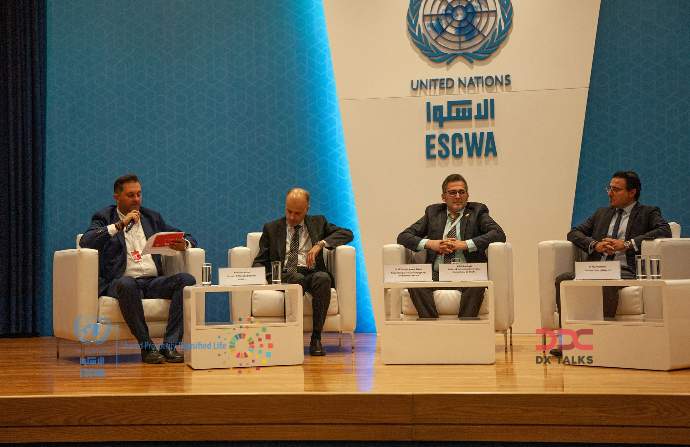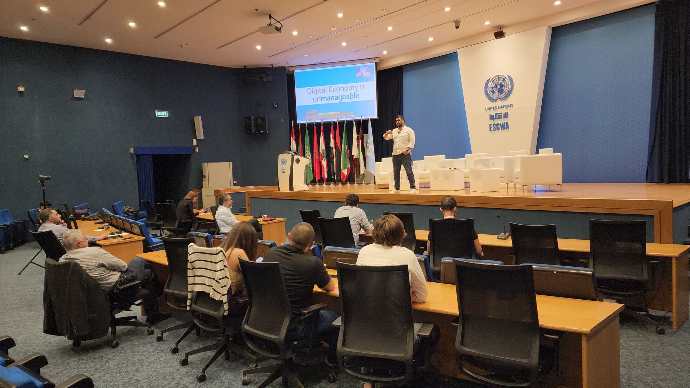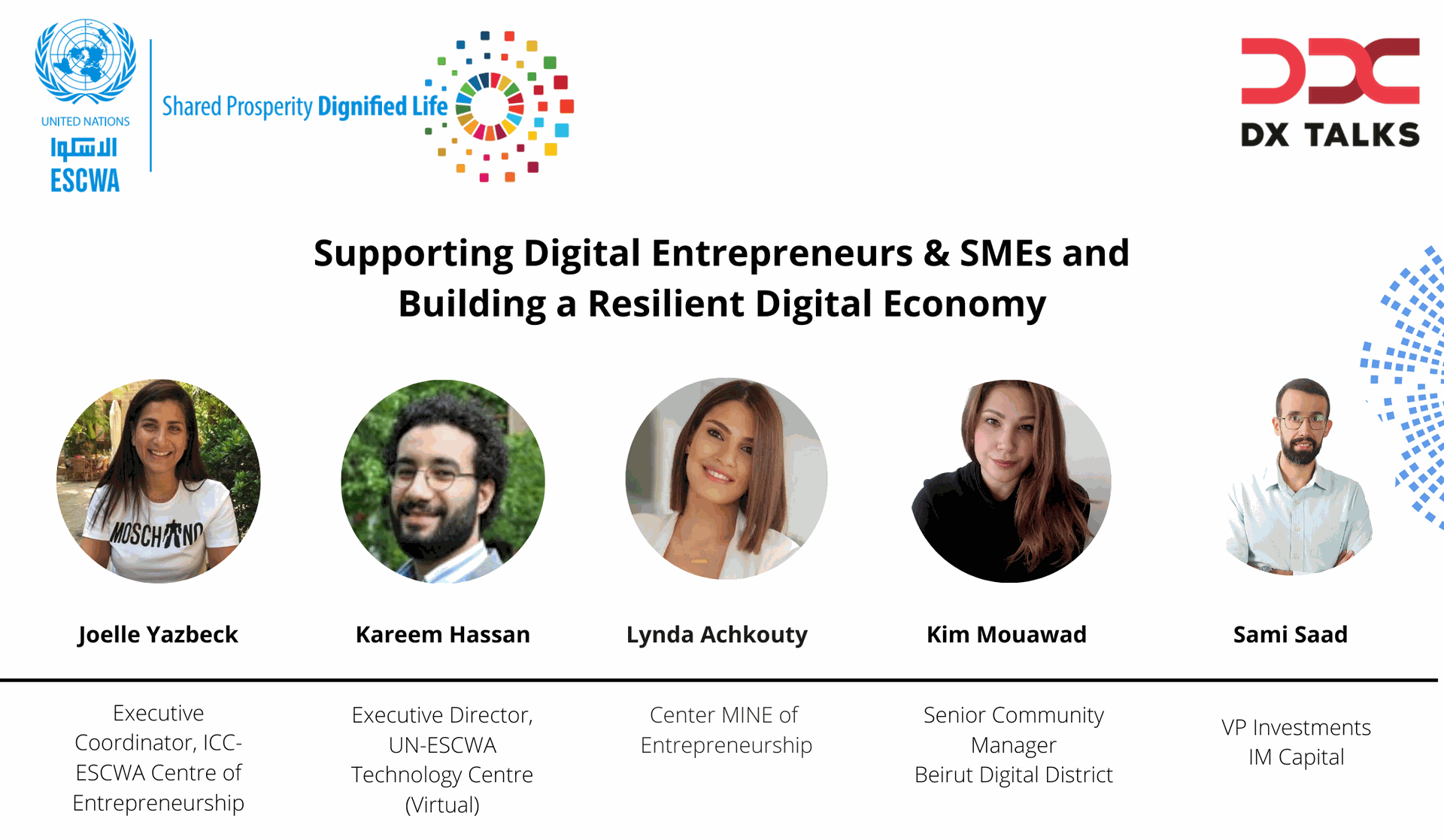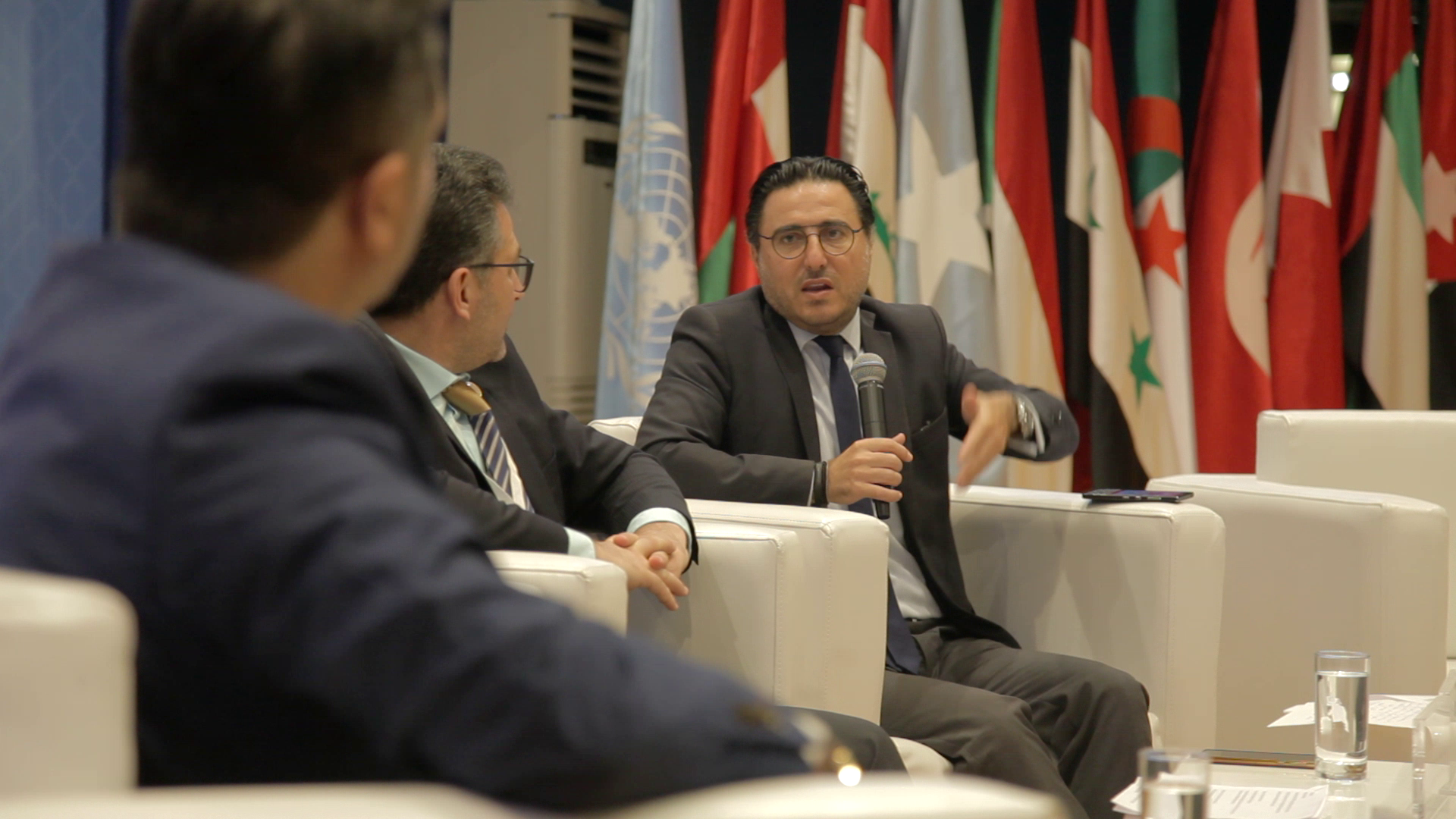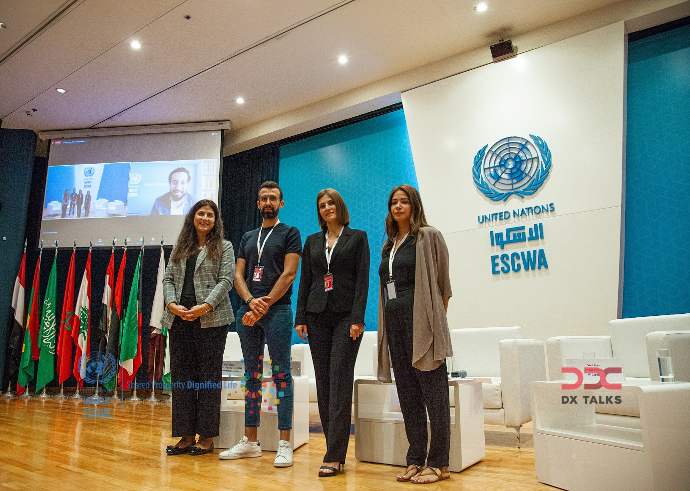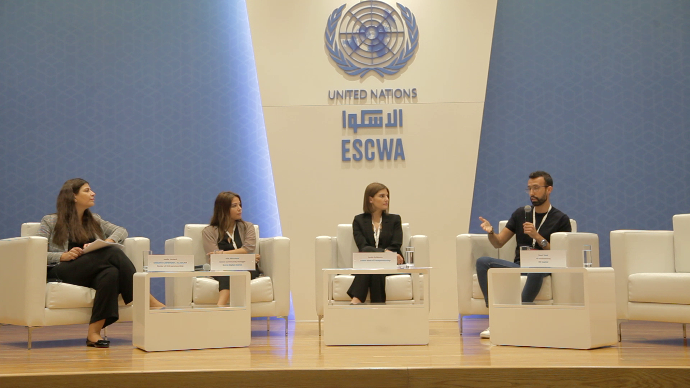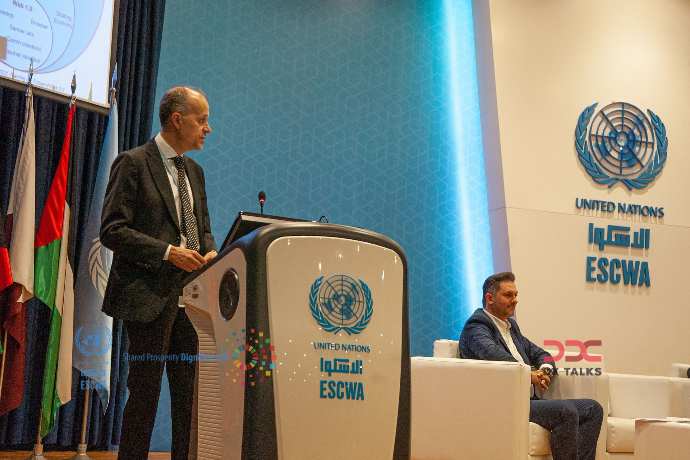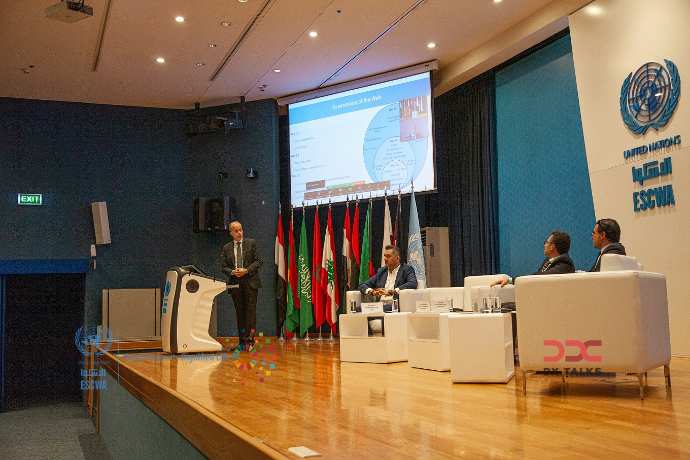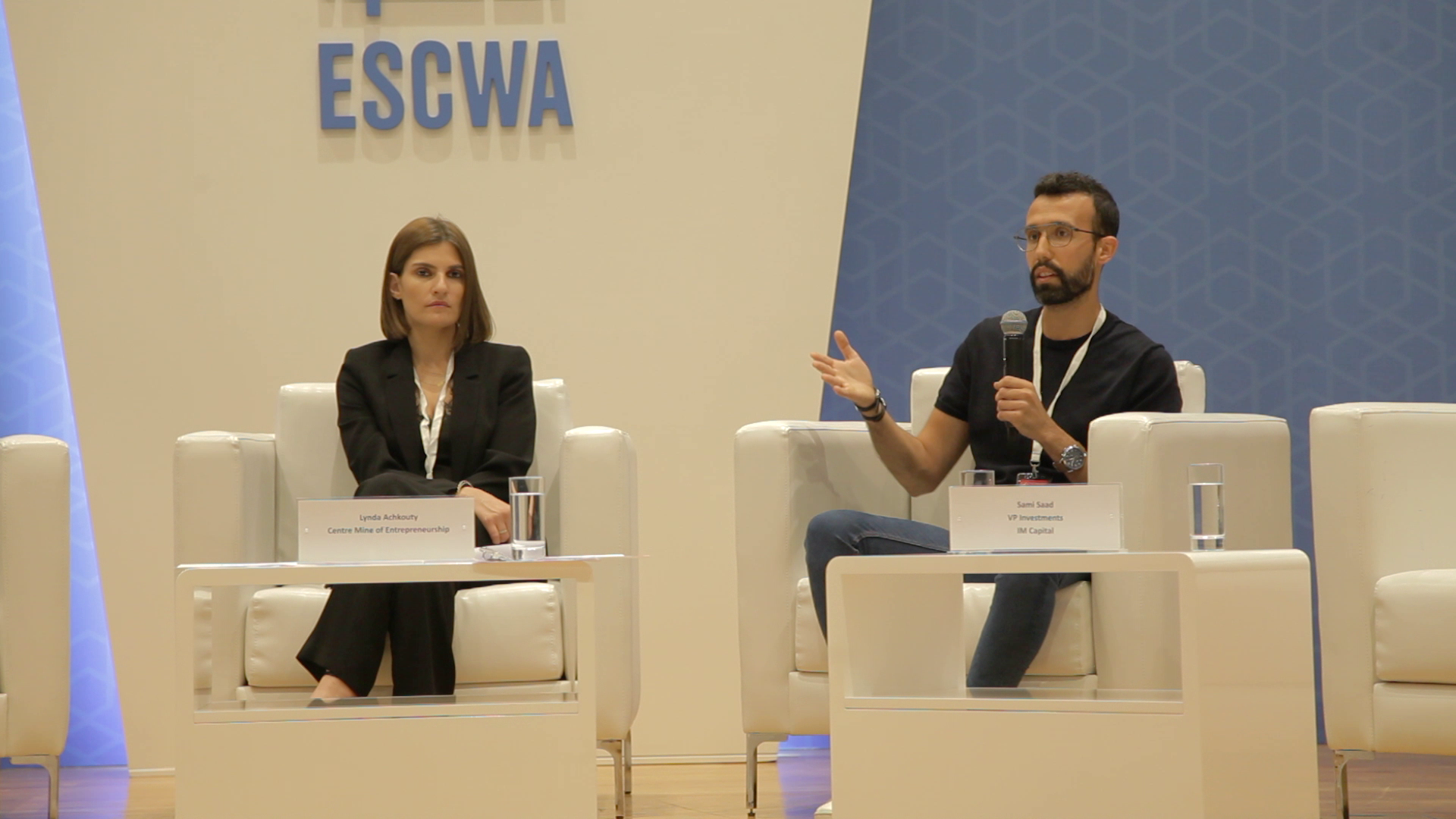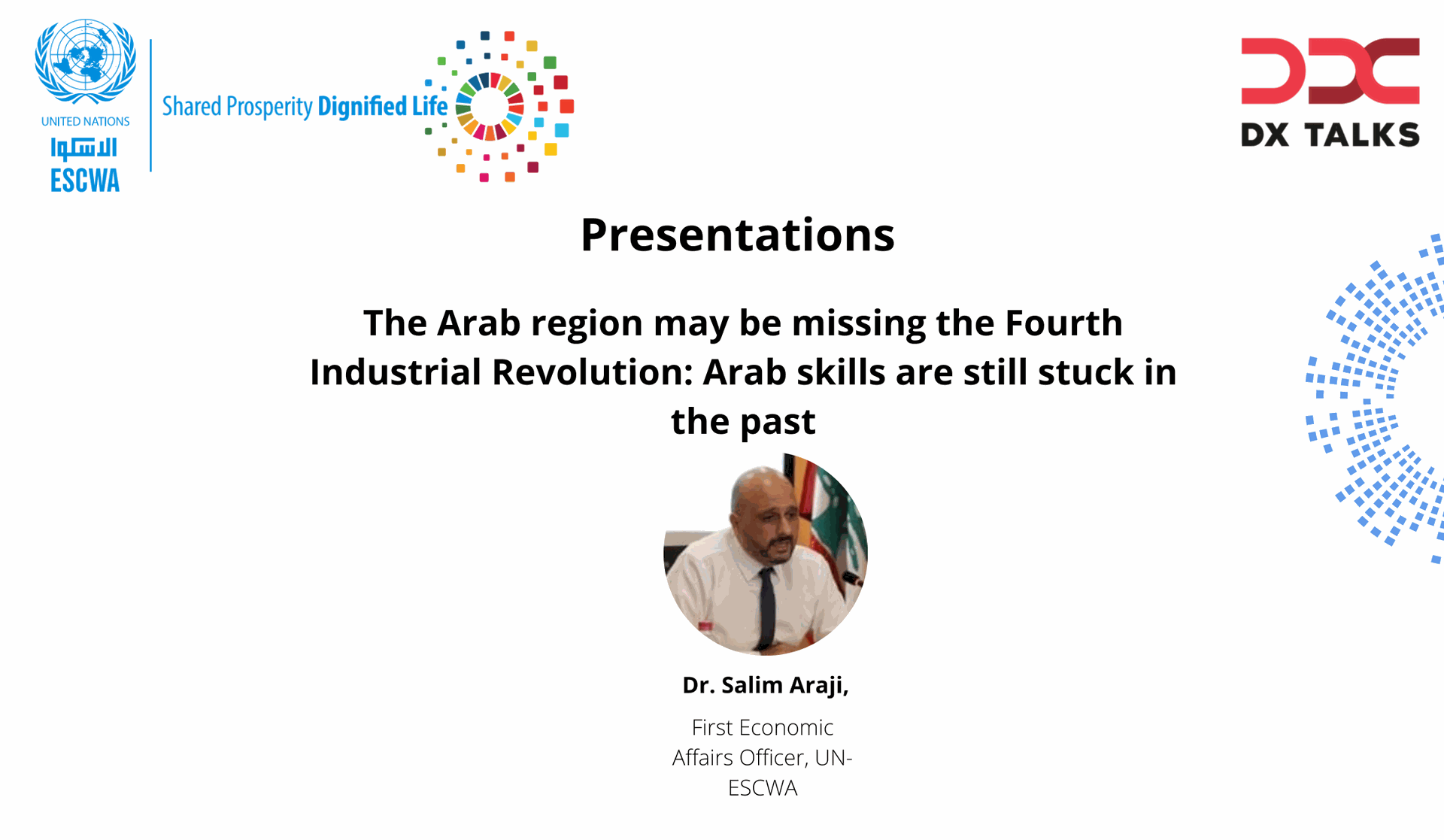Press Release

The ICC-ESCWA Centre of Entrepreneurship in collaboration with DxTalks the Digital Leaders platform organized an expert group meeting under the title “Reviving Lebanon Digital Economy” at the UN House in Beirut.
This first meeting was considered a national call to revive Lebanon's digital economy, hence serving as a platform to create a bridge between individuals, private, community, and public sectors, while providing Lebanese businesses with the tools to succeed.
This expert meeting included two-panel discussions around the role of the government, SMEs, and the private and community sectors in building a digital economy and about tools and strategies for supporting digital entrepreneurs and SMEs, thus building a resilient digital economy.
The meeting was opened by the Lebanese national anthem followed by Mrs. Joelle Yazbeck - Executive Coordinator, ICC-ESCWA Centre of Entrepreneurship followed by Mr. Rudy Shoushany - Founder and Managing Director, DxTalks,
Mrs. Joelle Yazbeck,
This Expert Group Meeting is of particular importance to
UN-ESCWA, which has been working with all countries in the Arab region to
address their current digital challenges to bridge the gap, so no country is
left behind. Only through multi-stakeholder and multi-lateral cooperation can
countries develop and eventually reach their digital potential.
Mr. Rudy Shoushany,
Emphasized the need to empower ourselves as a sector and collaborate on all levels, each member and each participant has a role to play in this coordinated and constructive process.
And most importantly Mr. Shoushany Emphasized the need for investments to create the Lebanese digital economy brand, and to start competing regionally and internationally otherwise we are missing the potential Lebanese talents and missing the fourth industrial revolution.
Then Mr. Shoushany invited the audience to come up with a
set of recommendations to outline a roadmap for strengthening the Lebanese
Digital Economy and put in place a framework for supporting digital
Entrepreneurs and SMEs in Lebanon.
Based on the discussions during the meeting between panelists and the audience, the below recommendations had been deducted
- There is a consensus that in the short term, the private and Community sector would be the main players in boosting the digital economy. However, in the mid-term and long-term, the role of the government is crucial and inevitable to enhance the infrastructure. As it is only the government that can work on regulations, ethical and simplified procedures, and who is to build a sustainable ecosystem.
- Applying e-Governance through the Public-Private Community Partnership (PPCP)
- Supporting and lobbying with the Government of Lebanon to conclude the policies for economic prosperity:
o Enabling specific legislation that helps support growth (company formation, tax incentives for startups, etc.)
o Helping launch the ready Artificial Intelligence (AI) Strategy while addressing the AI Workforce needs
o Establishing a digital economy platform
- Incentivize productive linkages between industries and universities by also creating strategic partnerships with regional and international research centers.
- As per the UN-ESCWA Report, the Arab world is missing the fourth industrial revolution, thus there is a need to promote and support the enhancement of digital skills throughout society.
- Development of a full-fledged national digital marketing strategy. This strategy is to include the establishment of a digital entrepreneurial website to bring together the entrepreneurs. This would be a booster for the evolvement of the digital economy sector. In addition, the strategy is to emphasize the role of women as actors of change and will embody tangible actions toward inclusion.
- The establishment of a digital entrepreneurship monitoring system, hence setting scorecards and scoreboards. That would be a support in stopping the immigration of youth and losing talents.
- Establishment of a national forum on digital economy bridging among entrepreneurs, SMEs, community, and public sectors by doing monthly & quarterly follow-ups and focus meetings while growing the representatives.
- Establishment of a robust digital infrastructure and building productive synergies. The private sector and investors are to be encouraged, especially a specific focus that should be on intrapreneurs i.e., entrepreneurs within existing groups.
- Designing and implementing an awareness outreach campaign on the digital economy, addressing its advantages, hence showing society what digital can bring to the table. In addition, encouraging the NGOs to work on digital activities and initiatives.
- The digital economy framework is to start in universities and schools. The young people are to be coached, involved, and encouraged through competition, and innovation, and empowerment of the right to education and the internet for every child (SDG 4 -9). Knowledge and learning events and training organized will include men and women decision-makers, stakeholders, and practitioners, thus ensuring equal opportunities and access for women and men.
Panels
Key Presentation Digital Government Transformation in the Arab Region: Policies
and Indicators
Dr.
Mohamad
Nawar Alawa, Regional Advisor on Technology for Development, UN-ESCWA
Panel
one Discussion – The role of
government, SMEs, the private sector, and NGOs & CSOs in
building a digital economy
Participants
Mr.
Rabih
Baalbaki, Dr. Fouad Zmokhol, Mr. Ali Abd Ali
Key Presentation – The Arab region may be missing the Fourth Industrial
Revolution: Arab skills are still stuck in the past
Dr.
Salim Araji, First Economic Affairs Officer, UN-ESCWA
Panel two Discussion – Supporting Digital Entrepreneurs & SMEs and
Building a Resilient Digital Economy
Mr. Kareem Hassan, Mrs. Lynda Achkouty, Ms. Kim Mouawad, Mr. Sami Saad
Key
Presentation – Opportunities
in the Blockchain, Metaverse & Emerging Technologies
Firas
Mghames, Founder, Managing Director, Feer McQueen
بيان صحفي
نظّم مركز ريادة الأعمال التابع لغرفة التجارة الدوليّة والإسكوا، بالتعاون مع
DxTalks، المنصّة الخاصّة بالروّاد الرقميّينThe Digital Leaders Platform،
اجتماعاً لمجموعة خبراء، تحت عنوان "إحياء الاقتصاد الرقميّ في لبنان
The Revival of Lebanon Digital Economy" في مركز الأمم المتحدة في بيروت.
كان هذا الاجتماع الأوّل بمثابة دعوة وطنيّة لإحياء الاقتصاد الرقميّ في لبنان، وبالتالي بمثابة منصّة لإنشاء جسر بين الأفراد والقطاع الخاصّ والمجتمع المدنيّ والعام، مع تزويد الشركات اللبنانيّة بأدوات النجاح.
تضمنّ اجتماع الخبراء هذا نقاشات من جلستين، حول دور الحكومة والشركات الصغيرة والمتوسّطة والقطاعين الخاصّ والمجتمع المدنيّ في بناء اقتصاد رقميّ، وحول الأدوات والاستراتيجيّات لدعم روّاد الأعمال الرقميّين والشركات الصغيرة والمتوسّطة، وبالتالي بناء اقتصاد رقميّ مرن.
افتتح الاجتماع بالنشيد الوطنيّ اللبنانّي، تلاه كلمة للسيّدة جويل يزبك - المنسّقة التنفيذّية لمركز ريادة الأعمال التابع لغرفة التجارة الدولية والإسكوا، ثمّ كلمة للسيّد رودي شوشاني - المؤسّس والمدير العامّ لشركة DxTalks .
جاء في كلمة السّيدة جويل يزبك:
يكتسب اجتماع فريق الخبراء هذا أهميّة خاصّة بالنسبة إلى "مركز ريادة الأعمال التابع لغرفة التجارة الدوليّة والإسكوا"، الذي يعمل مع الحكومات والمنظمات المتعددة الأطراف للدعوة إلى مواجهة التحدّيات الرقميّة التي تحول دون نجاح المشاريع الصغيرة والمتوسطة على الصعيدين الوطني والإقليمي، وإلى تحسين بيئة الأعمال في الأسواق النامية، ودعم قدرات المشاريع الصغيرة والمتوسطة على رقمنة أعمالهم.
أمّا السيد رودي شوشاني:
فأكدّ على الحاجة إلى تمكين أنفسنا كقطاع رقميّ والتعاون على جميع المستويات، بحيث يكون لكلّ عضوّ وكلّ مشارك دور فعّال يقوم به في هذه العملّية المنّسقة والبنّاءة.
والأهمّ من ذلك، قال: هي الحاجة إلى استثمارات في سبيل خلق العلامة التجاريّة للاقتصاد الرقميّ اللبنانيّ، والبدء في المنافسة إقليميّاً ودوليّاً، وإلّا فإنّنا نفقد المواهب اللبنانيّة المحتملة وتفوتنا الثورة الصناعيّة الرابعة.
ثمّ دعا السّيد شوشاني الخبراء المشاركين إلى الخروج بمجموعة من التوصيات تؤدّي إلى رسم خريطة طريق نحو تعزيز الاقتصاد الرقميّ اللبنانيّ ووضع إطار عمل لدعم روّاد الأعمال الرقمييّن والشركات الصغيرة والمتوسّطة في لبنان.
وعليه، وفي ضوء المناقشات، تمّ الاتفاق على التوصيات التالية:
- هناك إجماع على أنّ القطاع الخاصّ والمجتمع المدنيّ، سيكونان على المدى القصير اللاعبين الرئيسين في تعزيز الاقتصاد الرقميّ. ومع ذلك، على المدى المتوسّط والطويل، فإنّ دور الحكومة حاسم وحتميّ لتعزيز البنية التحتية، نظرًا لأنّ الحكومة وحدها هي التي يمكنها العمل على اللوائح والإجراءات الأخلاقيّة وآليّات العمل البسيطة ما سيبني نظامًا بيئيًّا مستدامًا.
- تطبيق الحوكمة الإلكترونيّة، من خلال الشراكة المجتمعية بين القطاعين العامّ والخاصّ والمجتمع المدنيّ.
- الدعم والضغط باتّجاه دفع الحكومة اللبنانيّة نحو سياسات الازدهار الاقتصاديّ:
o تمكين تشريعات محددّة تساعد في دعم النموّ (تكوين شركة، حوافز ضريبيّة للشركات الناشئة، إلخ.)
o المساعدة في إطلاق استراتيجيّة الذكاء الاصطناعيّ (AI) الجاهزة مع تلبية احتياجات القوى العاملة في مجال الذكاء الاصطناعيّ
o إنشاء منصّة اقتصاد رقميّ
- تحفيز الروابط الإنتاجيّة بين الصناعيّين والجامعات، من خلال إقامة شراكات إستراتيجيّة مع مراكز البحوث الإقليميّة والدوليّة.
- وفقًا لتقرير "الإسكوا"، يفتقد العالم العربيّ للثورة الصناعيّة الرابعة، وبالتالي هناك حاجة لتشجيع ودعم تعزيز المهارات الرقميّة في المجتمع.
- تطوير استراتيجيّة تسويق رقميّة وطنيّة كاملة تتضمّن هذه الإستراتيجيّة إنشاء موقع إلكترونيّ لريادة الأعمال الرقميّة للجمع بين روّاد الأعمال. وسيكون هذا بمثابة داعم لتطوّر قطاع الاقتصاد الرقميّ. بالإضافة إلى ذلك، تهدف الإستراتيجيّة إلى التأكيد على دور المرأة كفاعلة في التغيير، وتجسّد إجراءات ملموسة نحو الإدماج.
- إنشاء نظام رقميّ لرصد ريادة الأعمال، ومن ثمّ وضع معايير لتقييم الأداء والمؤشّرات. سيكون ذلك دعمًا لوقف هجرة الشباب وفقدان المواهب.
- إنشاء منتدى وطنيّ حول الاقتصاد الرقميّ، يربط بين روّاد الأعمال والشركات الصغيرة والمتوسّطة والمجتمع المدنيّ والقطاع العامّ، من خلال المتابعة الشهريّة والفصليّة والاجتماعات المركّزة مع زيادة عدد الممثّلين.
- إنشاء بنية تحتيّة رقميّة قويّة وبناء تآزر إنتاجيّ. يجب تشجيع القطاع الخاصّ والمستثمرين، وبالأخصّ التركيز المحدّد على روّاد الأعمال الداخليين، أي من ينتمون إلى المجموعات القائمة.
- تصميم وتنفيذ حملة توعية حول الاقتصاد الرقميّ ومزاياه، وما يمكن أن تقدّمه التكنولوجيا الرقميّة لطاولة المفاوضات، بالإضافة إلى تشجيع المنظمات غير الحكوميّة على العمل على الأنشطة والمبادرات الرقميّة.
- إطلاق إطار الاقتصاد الرقميّ من المدارس والجامعات. فيجب تدريب الأجيال الجديدة وإشراكها وتشجيعها، من خلال المنافسة والابتكار وتمكين كلّ طفل من بلوغ حقّه في تعلّم الانترنت (هدف التنمية المستدامة 4-9). وستشمل فعاليّات المعرفة والتعلّم والتدريب التي يتمّ تنظيمها، الرجال والنساء صنّاع القرار وأصحاب المصلحة والممارسين، مع ضمان تكافؤ الفرص بين النساء والرجال.
